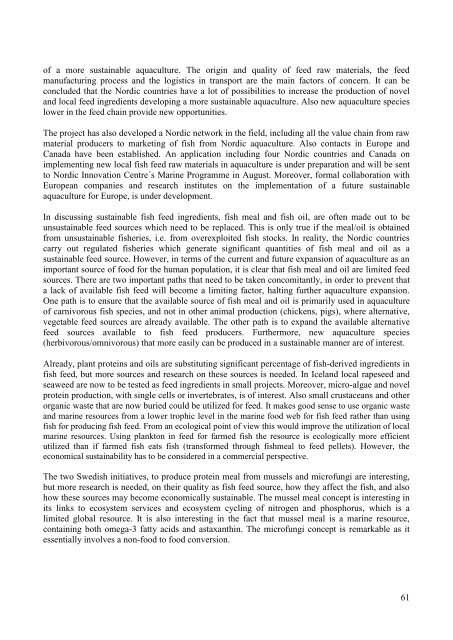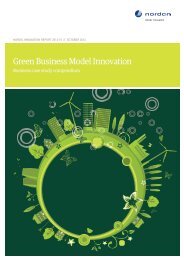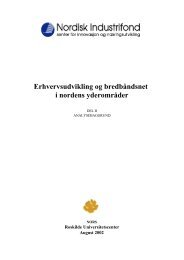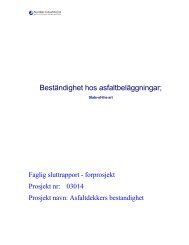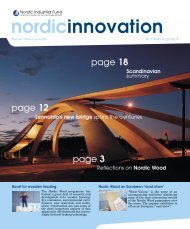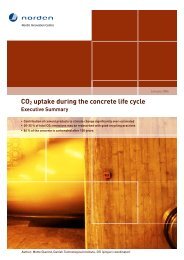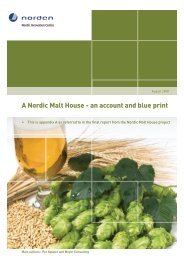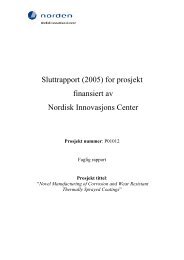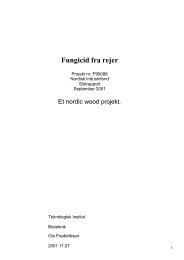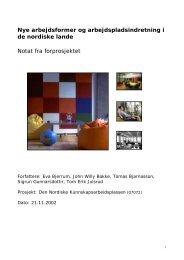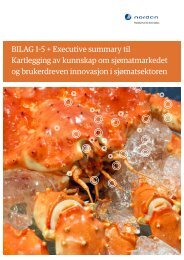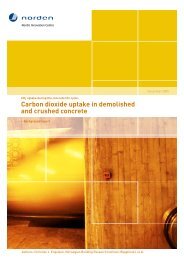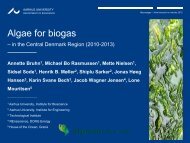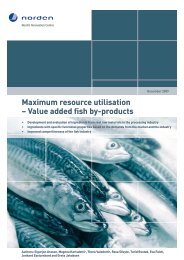Local raw materials for production of fish feed for ... - Nordic Innovation
Local raw materials for production of fish feed for ... - Nordic Innovation
Local raw materials for production of fish feed for ... - Nordic Innovation
You also want an ePaper? Increase the reach of your titles
YUMPU automatically turns print PDFs into web optimized ePapers that Google loves.
<strong>of</strong> a more sustainable aquaculture. The origin and quality <strong>of</strong> <strong>feed</strong> <strong>raw</strong> <strong>materials</strong>, the <strong>feed</strong><br />
manufacturing process and the logistics in transport are the main factors <strong>of</strong> concern. It can be<br />
concluded that the <strong>Nordic</strong> countries have a lot <strong>of</strong> possibilities to increase the <strong>production</strong> <strong>of</strong> novel<br />
and local <strong>feed</strong> ingredients developing a more sustainable aquaculture. Also new aquaculture species<br />
lower in the <strong>feed</strong> chain provide new opportunities.<br />
The project has also developed a <strong>Nordic</strong> network in the field, including all the value chain from <strong>raw</strong><br />
material producers to marketing <strong>of</strong> <strong>fish</strong> from <strong>Nordic</strong> aquaculture. Also contacts in Europe and<br />
Canada have been established. An application including four <strong>Nordic</strong> countries and Canada on<br />
implementing new local <strong>fish</strong> <strong>feed</strong> <strong>raw</strong> <strong>materials</strong> in aquaculture is under preparation and will be sent<br />
to <strong>Nordic</strong> <strong>Innovation</strong> Centre´s Marine Programme in August. Moreover, <strong>for</strong>mal collaboration with<br />
European companies and research institutes on the implementation <strong>of</strong> a future sustainable<br />
aquaculture <strong>for</strong> Europe, is under development.<br />
In discussing sustainable <strong>fish</strong> <strong>feed</strong> ingredients, <strong>fish</strong> meal and <strong>fish</strong> oil, are <strong>of</strong>ten made out to be<br />
unsustainable <strong>feed</strong> sources which need to be replaced. This is only true if the meal/oil is obtained<br />
from unsustainable <strong>fish</strong>eries, i.e. from overexploited <strong>fish</strong> stocks. In reality, the <strong>Nordic</strong> countries<br />
carry out regulated <strong>fish</strong>eries which generate significant quantities <strong>of</strong> <strong>fish</strong> meal and oil as a<br />
sustainable <strong>feed</strong> source. However, in terms <strong>of</strong> the current and future expansion <strong>of</strong> aquaculture as an<br />
important source <strong>of</strong> food <strong>for</strong> the human population, it is clear that <strong>fish</strong> meal and oil are limited <strong>feed</strong><br />
sources. There are two important paths that need to be taken concomitantly, in order to prevent that<br />
a lack <strong>of</strong> available <strong>fish</strong> <strong>feed</strong> will become a limiting factor, halting further aquaculture expansion.<br />
One path is to ensure that the available source <strong>of</strong> <strong>fish</strong> meal and oil is primarily used in aquaculture<br />
<strong>of</strong> carnivorous <strong>fish</strong> species, and not in other animal <strong>production</strong> (chickens, pigs), where alternative,<br />
vegetable <strong>feed</strong> sources are already available. The other path is to expand the available alternative<br />
<strong>feed</strong> sources available to <strong>fish</strong> <strong>feed</strong> producers. Furthermore, new aquaculture species<br />
(herbivorous/omnivorous) that more easily can be produced in a sustainable manner are <strong>of</strong> interest.<br />
Already, plant proteins and oils are substituting significant percentage <strong>of</strong> <strong>fish</strong>-derived ingredients in<br />
<strong>fish</strong> <strong>feed</strong>, but more sources and research on these sources is needed. In Iceland local rapeseed and<br />
seaweed are now to be tested as <strong>feed</strong> ingredients in small projects. Moreover, micro-algae and novel<br />
protein <strong>production</strong>, with single cells or invertebrates, is <strong>of</strong> interest. Also small crustaceans and other<br />
organic waste that are now buried could be utilized <strong>for</strong> <strong>feed</strong>. It makes good sense to use organic waste<br />
and marine resources from a lower trophic level in the marine food web <strong>for</strong> <strong>fish</strong> <strong>feed</strong> rather than using<br />
<strong>fish</strong> <strong>for</strong> producing <strong>fish</strong> <strong>feed</strong>. From an ecological point <strong>of</strong> view this would improve the utilization <strong>of</strong> local<br />
marine resources. Using plankton in <strong>feed</strong> <strong>for</strong> farmed <strong>fish</strong> the resource is ecologically more efficient<br />
utilized than if farmed <strong>fish</strong> eats <strong>fish</strong> (trans<strong>for</strong>med through <strong>fish</strong>meal to <strong>feed</strong> pellets). However, the<br />
economical sustainability has to be considered in a commercial perspective.<br />
The two Swedish initiatives, to produce protein meal from mussels and micr<strong>of</strong>ungi are interesting,<br />
but more research is needed, on their quality as <strong>fish</strong> <strong>feed</strong> source, how they affect the <strong>fish</strong>, and also<br />
how these sources may become economically sustainable. The mussel meal concept is interesting in<br />
its links to ecosystem services and ecosystem cycling <strong>of</strong> nitrogen and phosphorus, which is a<br />
limited global resource. It is also interesting in the fact that mussel meal is a marine resource,<br />
containing both omega-3 fatty acids and astaxanthin. The micr<strong>of</strong>ungi concept is remarkable as it<br />
essentially involves a non-food to food conversion.<br />
61


